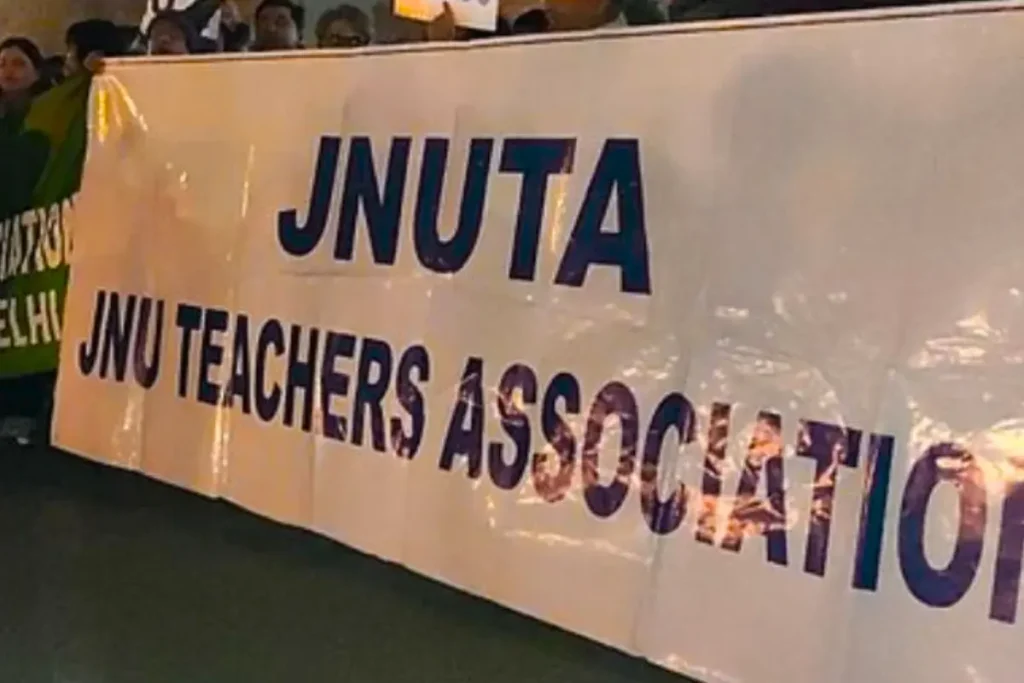The Jawaharlal Nehru University Teachers Association (JNUTA) is strongly against the JNU administration’s idea to have more classes on Saturdays and make winter vacations shorter. They say these plans, meant to fix the delay in CUET UG results 2024, go against the rights of teachers and students and don’t follow University Grants Commission (UGC) rules.
You Must Know: JNUTA Stands Firm
The Jawaharlal Nehru University Teachers Association (JNUTA) has firmly rejected the administration’s suggestion to hold additional classes on Saturdays and reduce the length of winter vacations. They say that these actions, which are meant to fix the delay in CUET UG results, go against the rules of the University Grants Commission (UGC). When we follow academic rules, we’re not just checking boxes – we’re actually safeguarding the integrity of our educational systems and ensuring that everyone involved is treated fairly.

| Information Category | Details |
|---|---|
| State | New Delhi |
| Organization | Jawaharlal Nehru University Teachers Association (JNUTA) |
| Official Site URL | Jawaharlal Nehru University (JNU) |
| Apply Link | Not specified |
| Course | Common University Entrance Test (CUET) UG results delay |
| Fees | Not specified |
| Academic Year | 2024 |
| Proposals | Extra Saturday classes, shortened winter vacations |
You Must Know: The Impact of CUET Retest
On July 14, the National Testing Agency (NTA) announced that over 1,000 candidates would need to retake the Common University Entrance Test (CUET). The latest news has added even more delay to the already lengthy results timeline. The results were first expected in early July. Because of this delay, JNU’s academic schedule is now messed up. The administration has suggested holding classes on Saturdays and shortening the winter holidays. One minor delay can lead to a major timing nightmare for the university’s carefully crafted academic calendar.
You Must Do: Understand the Effects on Faculty and Students
The JNUTA criticized the administration because they didn’t fix the problems in the CUET process. Instead, they put the responsibility on the faculty and students. Faculty warned that piling on six days of classes and shrinking winter breaks would leave them struggling to find time for research and writing. Students would also be under increased pressure to meet academic requirements in a shortened semester. Faculty and students alike benefit when academic demands are balanced with a focus on their overall well-being – a principle JNUTA strongly advocates for.
Official Statement from JNUTA
In their official statement, JNUTA highlighted the negative impacts of the NTA’s poor performance on the admissions process. They said, “The NTA’s bad performance has delayed admissions. Because of this, both semester length and vacation time have been shortened, which is not okay.” This statement shows the frustration and problems faced by the teachers and students because of the delays in CUET results.
Delays in CUET Results
The delay in CUET UG results has affected more than 1,000 candidates and made it harder for JNU to keep its academic schedule on track. To reduce the chaos in the admission process, the administration is working on a unified academic calendar that applies to every batch. Many a discourse has cropped up, each presenting a different take on this situation. Speed is crucial in higher education – the administration needs to stay on its toes to handle processes smoothly.
- Karnataka DCET 2024: Last Date for Entry Extended to July 18
- TS DSC Hall Ticket 2024 has been released on – tsdsc.aptonline.in
- UGC and Bharatiya Bhasha Samiti Start ‘ASMITA’ to Make 22,000 Books in Indian Languages
Demand for Compensatory Leave
JNUTA said that teachers didn’t get extra leave for their work during COVID-19, even though they missed their holidays. They said, “In June 2024, our salaries were cut a lot because they wanted the transport money back they gave us during COVID.” Teachers had to do online classes and exams with their own things, and JNU didn’t help. Pandemic-era faculty sacrifices demand recognition, and more importantly, tangible rewards in the form of fair pay and benefits.
Breach of UGC Guidelines
The JNU administration’s proposal to hold classes six days a week and shorten the winter break was criticized for violating UGC teaching and learning standards. Grounded in criticism, JNUTA squarely targets the irresponsible handling of power. With students and teachers facing discriminatory biases, institutional loyalty has degenerated into crippling compliance. Now the burning question looms – can these mismanaged entities reclaim lost credibility?
Consequences of Proposed Changes
The changes planned by JNU’s administration might reduce how much time professors have for research and writing. This could also make students feel more pressure to meet their academic goals in a shorter semester. The JNUTA stressed that the administration needs to solve CUET process problems instead of making unfair changes to the academic schedule. Our most vulnerable population – students and teachers – will pay the price if we don’t take the time to genuinely address these challenges; it’s time to own up to our responsibilities and get it right.

